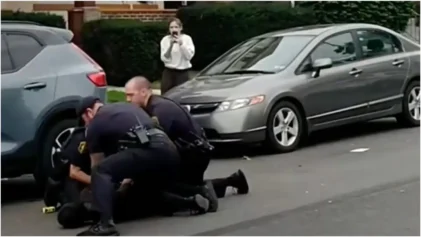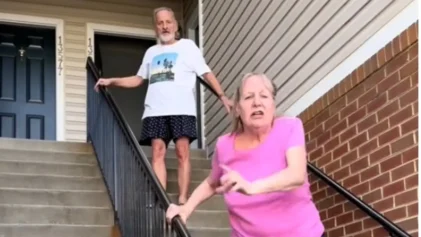A Michigan man who spent the last 15 years in prison for a murder he didn’t commit is still adjusting to freedom. C’quan Hinton, 33, was finally exonerated after being arrested during school lunch in 2007.
“Four and a half months don’t wash away the last 15 years,” Hinton told Clay Cane on Feb. 16.
Hinton’s wrongful conviction case follows a familiar pattern where prosecutors’ overreliance on a single witness costs an innocent person many years of their life.
Hinton’s life changed on Oct. 9, 2007, when Robert Person, 14, was shot three times in Burton, Michigan, just outside of Flint, Michigan. He later died at the hospital from his gunshot wound injuries.
During the police investigation, police recovered “35 shell casings,” according to The National Registry of Exonerations.
Investigators started connecting a slew of people related to Person’s shooting. On October 13, 2007, another shooting occurred at a convenience store near the location of Person’s shooting. During that investigation, police found a gun with shell casings that matched those found in Person’s shooting days earlier.
Seven days after Person’s shooting, then-15-year-old Jarylle Murphy came forward as a witness to Person’s shooting, telling Flint police what he saw. He told police he saw Person was confronted by four men with guns in a gray Dodge van. He gave a recorded interview detailing the description of the shooters’ physical appearance and the kinds of firearms used during the shooting. He said the guns included “two handguns, one AK-47, and one TEC-9.”
Police showed Murphy a photographic lineup of potential suspects, and Murphy identified Hinton as one of the gunmen. Murphy was shown another photographic lineup on Nov. 8, 2007, in a follow-up interview with police. During the second interview, Murphy identified Kino Christian, Dartanion Edwards, and Joshun Edwards as the other men alongside Hinton on the day of Person’s shooting.
In November 2007, police arrested Hinton, Christian, Joshun and Dartanion Edwards.
During Hinton’s recent interview, he recalled the day he was arrested while having school lunch on Nov. 10.
“The truancy officer came into the lunchroom during lunch, and he told me to come here. When I get there, the principal is sitting in her office along with two uniformed officers and the detective said, ‘I got you now,’ and they take me to the jail,” Hinton said.
Hinton told Cane he began questioning the witness’ credibility early on as he was described as “light brown skin with light brown eyes.” Hinton has a darker brown complexion and dark brown eyes.
Hinton said his attorney told him at the time he had nothing to worry about because DNA collected from the shell casings should clear him, but that was not the case.
During the trial in January 2009, prosecutors provided Murphy’s interview transcript from Nov. 8, 2007, but not the transcript from the initial Oct. 16, 2007, interview.
The two interviews had discrepancies that could have proved Murphy was an unreliable witness had both transcripts been shared during the trial.
The timeline of events on the day of the shooting, who was present, clearly indicating if Person was sitting or walking when the shooters approached him, and where Murphy ran to after the shooting were all discrepancies that did not align in both of Murphy’s witness accounts.
On Feb. 17, 2009, Hinton and his co-defendants were all convicted of first-degree murder, assault with intent to commit murder, commission of a felony with a firearm and illegal possession of a weapon. They were sentenced to life in prison without parole.
Hinton recalls his thoughts the day his sentence was handed down.
“I was trying to prepare myself mentally, and I knew what first-degree murder convictions came with mandatory life. When you hear those words, it’s a different feeling,” Hinton said.
Hinton said while incarcerated in a Michigan prison, he spent countless hours studying the law. He admitted he painstakingly struggled through legal literature to find ways to prove he didn’t murder Person.
“I was just going to hit the law library and do whatever I can to learn the ins and outs of the law that’ll give me the best opportunity to come home,” Hinton said.
In 2014, Hinton’s codefendant, Joshun Edwards’ family, filed a Freedom Of Information Act request to get their hands on the transcript to prove the discrepancy in Murphy’s testimony. After the FOIA was granted, the four men convicted all filed motions to have their cases reviewed again by the court. After a series of appeals, the Michigan Supreme Court finally got to review their case beginning in March 2022.
The court believed Murphy’s testimony was “central to the prosecution’s case, and the suppressed transcript would have significantly undermined it,” CBS News reported.
On July 27, 2022, the Michigan Supreme Court threw out the murder convictions of Joshun Edwards, Hinton and Christian. The court ruled their rights were violated when investigators failed to share evidence via the transcripts with defense lawyers, which is a Brady violation.
Court documents say Dartanion Edwards did not move for relief from judgment, but after the ruling for his co-defendants, the Michigan Innocence Clinic was appointed to represent him.
The four men were released on bond from prison on Sept. 20, 2022. They were exonerated on Dec. 22 when the prosecution dismissed the cases against them.
Hinton turned 33 years old in February, and while this is the first birthday he celebrated as a free man in 15 years, he has mixed feelings about it.
“The last 15 years, I don’t want to celebrate that,” he said.
Exonerated prisoners in Michigan are eligible for up to a year of reentry housing and two years of other supportive services, including job placement, job training, transportation and more. The Michigan Department of Corrections pays for the services.


